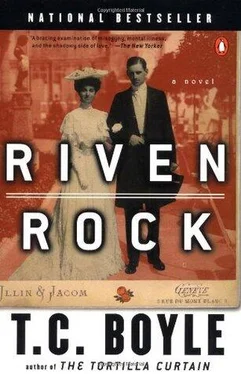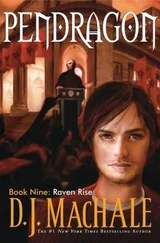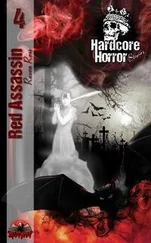T. Boyle - Riven Rock
Здесь есть возможность читать онлайн «T. Boyle - Riven Rock» весь текст электронной книги совершенно бесплатно (целиком полную версию без сокращений). В некоторых случаях можно слушать аудио, скачать через торрент в формате fb2 и присутствует краткое содержание. Год выпуска: 1999, Издательство: Penguin Books, Жанр: Современная проза, на английском языке. Описание произведения, (предисловие) а так же отзывы посетителей доступны на портале библиотеки ЛибКат.
- Название:Riven Rock
- Автор:
- Издательство:Penguin Books
- Жанр:
- Год:1999
- ISBN:нет данных
- Рейтинг книги:5 / 5. Голосов: 1
-
Избранное:Добавить в избранное
- Отзывы:
-
Ваша оценка:
- 100
- 1
- 2
- 3
- 4
- 5
Riven Rock: краткое содержание, описание и аннотация
Предлагаем к чтению аннотацию, описание, краткое содержание или предисловие (зависит от того, что написал сам автор книги «Riven Rock»). Если вы не нашли необходимую информацию о книге — напишите в комментариях, мы постараемся отыскать её.
Riven Rock — читать онлайн бесплатно полную книгу (весь текст) целиком
Ниже представлен текст книги, разбитый по страницам. Система сохранения места последней прочитанной страницы, позволяет с удобством читать онлайн бесплатно книгу «Riven Rock», без необходимости каждый раз заново искать на чём Вы остановились. Поставьте закладку, и сможете в любой момент перейти на страницу, на которой закончили чтение.
Интервал:
Закладка:
Two weeks later, Harold stopped by Mrs. van Pele’s to look him up. He brought Edith with him — they were honeymooning in Europe and had just arrived on the Continent after a week’s stay in London — and Edith balanced herself like a buttercup on the cushions of Mrs. van Pele’s best chair with a glass of Mrs. van Pele’s best sherry on her knee while Harold went up to fetch Stanley down from his rooms. Unfortunately, Stanley wasn’t fetchable — at least not at first. Harold found him in bed, lying atop the bedclothes on his side with his wrists and ankles drawn up awkwardly behind him; his face was turned to the wall and he didn’t look up when his brother entered the room.
“Stanley!” Harold boomed, and he was an effervescing bubble of enthusiasm, filled to bursting, a twenty-two-year-old millionaire intoxicated with his new bride and his travels and his unshakeable alliance with the Rockefellers. “Wake up,” he cried, “Harold’s here! Come on, little brother, get up out of that bed and let’s drink some champagne and celebrate!” “
But Stanley didn’t get up out of bed — he barely lifted his eyes. As Harold looked on, stupefied, Stanley’s shoulders began to heave, his visible eye clouded over and he began weeping, his breath coming in a series of harsh protracted gasps that seemed to suck all the air out of the room.
“What is it, Stanley?” Harold said, the enthusiasm erased from his voice. “Are you still sick? Is it that Egyptian thing?”
A long moment, the gasps fighting for control. “Worse,” Stanley croaked, “a thousand times worse. I’ve lost my immortal soul.”
It took nearly an hour to extract the story from him, Stanley hesitant and euphemistic, his shame burning in his eyes as he talked on and on about repentance, atonement and eternal damnation, and twice during that time Harold descended to the parlor to commiserate with his bride, whom he would divorce twenty-six years later for the ambitious operatic fleshpot, Ganna Walska, and twice sent down for scalding cups of tea. Stanley told him how he’d been searching for the unfortunate girl for two weeks now and had even gone to the trouble of hiring a private detective to track her down, but with no success. He’d been in too much of a state over the enormity of his crime to have paid any attention to the street or even the neighborhood where he’d awakened on that fateful morning, and though he’d haunted the alleys and byways around the Gare du Nord every night since, he’d been unable to locate her. He didn’t know her address, her place of business, her connections, and yet he was determined to do the right thing by her — determined, in short, to marry her.
When Harold had heard him out, the room stifling, his wife impatient and petulant and the landlady wearing the mask of a tragedian as she tiptoed through the door with the tea things, he felt nothing but relief. Only Stanley could be so hopelessly naive, he thought, Stanley the holy, Stanley the sheltered, and he didn’t want to laugh at that naïvete — this was a delicate situation, he knew that — but in the end he couldn’t help himself. “Is that it?” he said. “Is that all of it?” And then he laughed. Guffawed. Let out with a howl his wife could hear downstairs as she fretted and grimaced and swore she’d get him back for this.
“Stanley, Stanley, Stanley,” he said finally, and the laughter rolled off him in sheets, like a disturbance of the weather, and there was no stopping it. “Don’t you see? She’s a prostitute, a putain, a whore. She’s had you and a thousand other men. She’s no purer than Beelzebub — and she’s gone and fleeced you on top of it. Why do you think she disappeared? Because your sapphire stickpin and your gold watch and the hundred-franc notes in your wallet bought her a six months’ holiday in a very comfortable hotel in Marseille or Saint-Tropez or some such place.”
Stanley was sitting up now, staring into the dark waters of his teacup like a suicide brooding over the Seine. His voice was dead in his throat. “I’ve got to marry her.”
“Don’t be absurd.”
Those swollen suffering eyes, the eyes of the anchorite and the mad suffering saint: Stanley was staring at him now. Fixedly. “Easy for you to say — you’re a respectable man. You’re married. You’re clean.”
Harold was on his feet, all patience lost, striding to and fro with the shell of an empty teacup in his hand. It was getting late, Edith was furious and Stanley, gloomy deluded Stanley, was spoiling his good time. He gave it one more try, pulling up short right in front of him, right at his very feet. “She’s a slut, Stanley, a professional. You don’t owe her anything, not money or redemption — if I were you, I’d be worrying about disease, not marriage. It’s crazy. Mad. Irresponsible.” Suddenly he was shouting. “You don’t marry a whore!”
“She’s not a whore.”
“She is.”
“She’s not. You don’t even know her.”
“Why did she let you have her then? Why did she take you home? Huh? Why do think she makes her offices in the street?”
Stanley was silent a long while, and they looked at each other in mutual disgust, each wondering how he could possibly be related to the other. From below came the faint unremitting buzz of Mrs. van Pele’s banalities as she bored Edith into an upright grave. Finally, just as Harold felt he could take it no longer, on the very brink of slamming his way out of the room and to hell with his little brother and his saintly scruples, Stanley spoke up. “What am I going to tell Mother?” he said.
After that, Stanley never strayed from the straight and narrow. He came home directly after his lessons with Monsieur Julien, and to help fill his evenings when he wasn’t praying with Mrs. van Pele or entertaining her with his clarion renditions of “Macedonia” and “Surely Goodness and Mercy Will Follow Me All the Days of My Life,” he took vocal lessons with the renowned tenor, Antonio Sbriglia. There was no thought of playing cards, obscene or otherwise, no desire to frequent cafés or even restaurants, no further mention of marriage to Mireille Sancerre or anyone else. He polished his modest skills under Monsieur Julien’s tutelage, producing a series of charcoal studies of the Pont-Neuf at every hour of the day, from the savage tranquillity of dawn to the miasmic melancholy of the swallow-hung evening, and he became expert at reproducing Cézanne’s apples. He was genuinely offended by the excesses of Toulouse-Lautrec and Degas, and though Monsieur Julien urged him to begin a study of the human form, he steadfastly refused. Two months to the day after his mother departed for the United States, he was on the boat home.
For the next six years, Stanley lived with his mother in the family fortress at 675 Rush Street, fixed in the mise-en-scène of his childhood like a stamp in a philatelist’s album. He had his own room now, of course, with a view of the gardens and a private bath, but the nursery where he’d spent the better part of his life remained unchanged and the halls were a stew of recollected odors, from the sharp stab of the camphor ointment his father used to rub on his ankles and knees to assuage the ravages of his rheumatism to the ghostly echo of Mary Virginia’s French perfume and the lingering dark must of a long-dead beagle by the name of Digger. He worked full-time at the Reaper Works, of which Cyrus Jr. was president and Harold vice president, juggling his schedule to accommodate his course load at Northwestern, where he was studying contract law. Officially, he was comptroller of the company, but Nettie was grooming him to oversee the legal department as well, thus consolidating all the McCormicks’ vital interests in the hands of her sons, after the model of the Medicis.
Читать дальшеИнтервал:
Закладка:
Похожие книги на «Riven Rock»
Представляем Вашему вниманию похожие книги на «Riven Rock» списком для выбора. Мы отобрали схожую по названию и смыслу литературу в надежде предоставить читателям больше вариантов отыскать новые, интересные, ещё непрочитанные произведения.
Обсуждение, отзывы о книге «Riven Rock» и просто собственные мнения читателей. Оставьте ваши комментарии, напишите, что Вы думаете о произведении, его смысле или главных героях. Укажите что конкретно понравилось, а что нет, и почему Вы так считаете.












